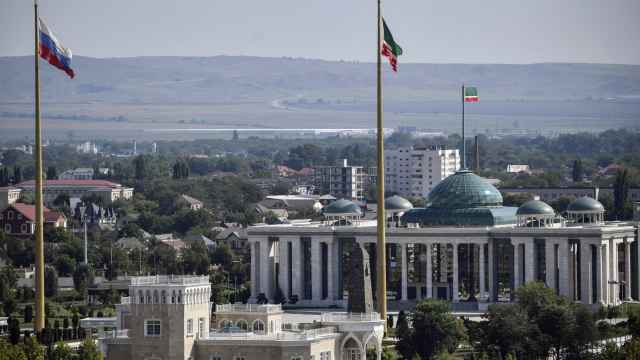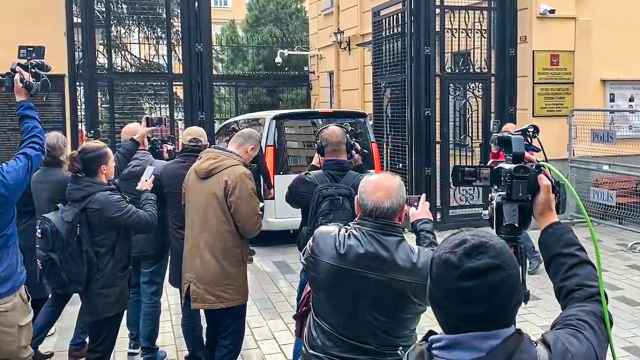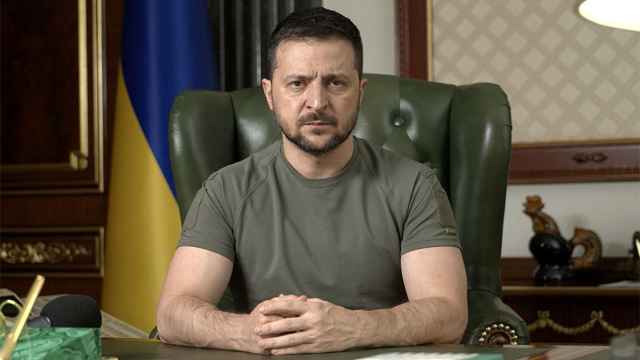During the past few weeks, Russians watching state-controlled television channels were treated to a spectacle as President Dmitry Medvedev and Prime Minister Vladimir Putin competed to prove who could better copy Mayor Yury Luzhkov.
One example was when Medvedev traveled to the Voronezh region where he dug up potatoes and lamented that they were no larger than peas. Then he was off to Kursk to personally check the quality of bread sold in a store for war veterans. Not to be outdone, Putin was shown overseeing the construction of new dwellings for residents of Verkhnyaya Vereya in the Nizhny Novgorod region who lost their homes during the summer’s wildfires. On Friday, he held a videoconference to discuss the resettlement of residents of the Siberian town of Tynda from their old and dilapidated houses.
All these methods are a direct imitation of Luzhkov’s management style that he introduced in 1992. That was when he took over the job from so-called democratic mayor, Gavril Popov, under whose administration rotting trash piled up in the streets for days, the stench reaching as far as the city center.
Medvedev’s and Putin’s desire to adopt Luzhkov’s style is understandable, but the president and prime minister haven’t quite got it down yet. For example, several years ago, new benches and children’s playground equipment suddenly appeared in our courtyard to replace those that had been destroyed by vandals. An elderly neighbor who keeps abreast of all the latest developments told me, “Luzhkov announced plans to visit a locale in our vicinity, and since he never makes his route known in advance, the officials decided to spruce up the whole neighborhood, just in case.”
Can you imagine how Russia would change if Medvedev and Putin could master the same management skills? Let’s say that when Medvedev was planning a trip to the Voronezh region, he didn’t mention whether he would be digging up potatoes or checking on local businesses to see if they are using innovative technologies. At the same time, he could have hinted that he might make unscheduled stops to the neighboring Tula and Lipetsk regions. That would be the best way to accelerate modernization without having to employ pressure tactics.
This raises a question: What stands behind the open attacks against Luzhkov on the state-controlled Channel One, Rossia One and NTV television stations? My guess is that as the new television season gets under way, those stations are simply jealous of TV Center, the television station controlled by Luzhkov. Two names are sufficient proof: Alexei Pushkov, the conservative host of TV Center’s weekly analytical program “Postscript,” and Leonid Mlechin, the liberal anchor of historical programs. Those two examples alone demonstrate that the number of independently minded journalists at Luzhkov’s channel surpass the other three combined. What’s more, Luzhkov has two more quite decent television channels that broadcast only to Moscow: Stolitsa and Doveriye.
The best way for Putin and Medvedev to demonstrate their independence from the state-controlled stations and strengthen their admiration for Luzhkov would be to give the top nationwide frequencies occupied by Channel One, Rossia One and NTV to TV Center, Stolitsa and Doveriye.
In this way, the 74-year-old Luzhkov could quietly resign with his reputation intact as a senior statesman who rescued Moscow from heaps of garbage and who took initial steps toward the creation of public television in Russia. Medvedev and Putin could only gain from such a move.
Alexei Pankin is editor of WAN-IFRA-GIPP Magazine for publishing business professionals.
A Message from The Moscow Times:
Dear readers,
We are facing unprecedented challenges. Russia's Prosecutor General's Office has designated The Moscow Times as an "undesirable" organization, criminalizing our work and putting our staff at risk of prosecution. This follows our earlier unjust labeling as a "foreign agent."
These actions are direct attempts to silence independent journalism in Russia. The authorities claim our work "discredits the decisions of the Russian leadership." We see things differently: we strive to provide accurate, unbiased reporting on Russia.
We, the journalists of The Moscow Times, refuse to be silenced. But to continue our work, we need your help.
Your support, no matter how small, makes a world of difference. If you can, please support us monthly starting from just $2. It's quick to set up, and every contribution makes a significant impact.
By supporting The Moscow Times, you're defending open, independent journalism in the face of repression. Thank you for standing with us.
Remind me later.





